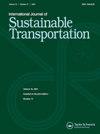Life cycle thinking-based analysis of diesel and electric-powered buses for Canadian transit systems
Abstract
Increasing greenhouse gas emissions from the conventional fleet of diesel buses has made Canadian transit agencies explore low-emission alternative fuels. Despite electric buses showing great potential to reduce emissions during their operational phase, the transformation from diesel buses to electric buses would require in-depth analysis pertaining to their economic and social implications. Published literature highlights the importance of developing a comprehensive framework that considers multiple decision parameters over a life cycle perspective for analyzing different fuel options to replace the existing fleet of diesel buses. This paper assesses the triple-bottom-line sustainability of diesel and electric buses in different regions of Canada. Moreover, a framework is proposed to incorporate multiple decision criteria (life cycle environmental, economic, and social impacts) over different perspectives to make the best decisions for transitioning the diesel bus fleet. The results showed that the environmental performance of electric buses highly depended on the electricity grid mix. Despite diesel buses having a low cost of production compared to electric buses, most provinces showed a low life cycle operational cost for electric buses. Electric buses’ life cycle social impacts are high during their production stage, whereas diesel buses have the highest social impacts during their operational phase. Overall, electric buses have a high sustainability performance in all provinces and territories in Canada except Nunavut. The proposed framework and findings can aid policymakers and planners in implementing electric buses for public transit systems in Canada and beyond.

 求助内容:
求助内容: 应助结果提醒方式:
应助结果提醒方式:


